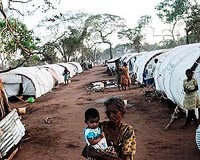| . |  |
. |
Tel Aviv, Israel (UPI) Jan 20, 2009 Israel's vaunted military is facing a growing problem with Orthodox soldiers refusing to move against hard-line Jewish settlers in the West Bank, and now the army is warning that up to 40 percent of young Israelis will evade military service over the next decade. This phenomenon, which reflects the deep divisions within Israeli society over whether to make peace with the Palestinians and surrender the West Bank, has been growing for more than a decade. It also reflects profound changes in Israeli society since the pioneering socialist and kibbutznik era and the more mobile and materialistic generation that has emerged. Indeed, according to the head of the Israeli military's Personnel Directorate, Maj. Gen. Avi Zamir, at the rate that draft dodging is growing the nation will be facing disaster a few years down the road. He predicted that within 10 years as many as 40 percent of Jewish youngsters would refuse to serve in the military. "Taking into consideration Israeli Arab youths, we're facing a situation in which 70 percent of youths will not enlist to military," Zamir said. "Even now, the notion of 'the people's army' is fraying and if these trends continue we'll be on the brink of an abyss." According to military data for 2008, 72 percent of teenage Jewish boys and 54 percent of girls enlist in the military, putting draft-dodging rates at 37 percent. In Israel military service is compulsory, with men serving three years and women 21 months. Over the last decade or so, hundreds of refuseniks have been imprisoned for their actions, mainly for refusing to serve as occupation troops in Palestinian territories. Ironically, it was the Israeli military's stunning victory over the Arabs in the 1967 war that started it all. Many Israelis, mainly leftists, saw the occupation of Arab land by a people who had endured the Holocaust as morally wrong. But it was not until the June 1982 invasion of Lebanon, and the subsequent occupation of half the country that lasted in one form or another until May 2000, that the refusenik movement truly emerged. Many Israelis believed the war in Lebanon -- including the massacre of thousands of Palestinian refugees by Israel's Lebanese Christian allies -- and the monthlong bombing of West Beirut were immoral. But it was not until the Palestinians' second intifada, or uprising, against the occupation in September 2000, and the resulting massive Israeli crackdown in which hundreds of civilians perished, that the refusenik movement finally coalesced and questioned the legitimacy of the occupation. In January 2002, 52 reserve officers and soldiers, organized as the "Courage to Refuse" movement, signed a petition saying they would not serve in the occupied territories. In September 2003, 27 air force pilots, part of the elite of the Israeli military, refused to take part in missions to assassinate Palestinian leaders from the skies, in effect recognizing the legitimacy of Palestinian resistance. All, including a reserve brigadier general, a fighter ace who shot down 15 planes during Israel's wars, were dismissed from the service. In November 2003 four former heads of the Shin Bet security service caused an uproar by warning that the continued occupation endangered Israel's very existence. A month later three officers and 10 troopers of another elite unit, the highly secret Sayaret Metkal, Israel's equivalent of the U.S. Army's Delta Force or the Navy's SEALs, caused a sensation when they refused to participate in the re-occupation of the West Bank in 2004. The intifada "created a semblance of consensus in Israeli society" and "brought a far-reaching change in the extent of refuseniks and the attitude toward them," commentator Lily Galili wrote in the liberal daily Haaretz in May 2004. "The sweeping social condemnation cracked as left-wing politicians, public figures and senior academics openly supported them. From something beyond the pale, conscientious objection forced itself into the public discourse." She noted presciently: "One of the main fears of the left was that supporting it would legitimize right-wing disobedience when it comes to evacuating settlements." When Israel withdrew unilaterally from Gaza in September 2005, abandoning a dozen settlements, there were protests by some soldiers. They and the hard-line far right saw that pullout as the harbinger of an eventual withdrawal from the West Bank. Now, with U.S. President Barack Obama pressing Israel to curtail settlements there, Zamir's "abyss" seems to be getting closer.
Share This Article With Planet Earth
Related Links
 Tamil vote crucial in Sri Lanka election
Tamil vote crucial in Sri Lanka electionColombo, Sri Lanka (UPI) Jan 19, 2009 The two main contenders in next Tuesday's presidential election in Sri Lanka were given the most credit by their majority Sinhalese people for ending the civil war for a separate Tamil homeland, but as the polling date approaches, it may be the minority Tamil vote that decides the final outcome. President Mahinda Rajapaksa announced the Jan. 26 election seeking another term although he ... read more |
|
| The content herein, unless otherwise known to be public domain, are Copyright 1995-2009 - SpaceDaily. AFP and UPI Wire Stories are copyright Agence France-Presse and United Press International. ESA Portal Reports are copyright European Space Agency. All NASA sourced material is public domain. Additional copyrights may apply in whole or part to other bona fide parties. Advertising does not imply endorsement,agreement or approval of any opinions, statements or information provided by SpaceDaily on any Web page published or hosted by SpaceDaily. Privacy Statement |